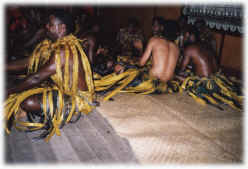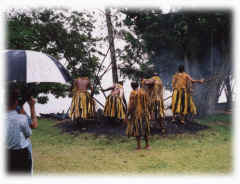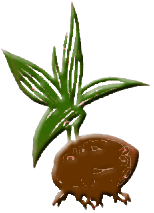In a nutshell
Nature
Population
Beqa (pronounced Mbengga) lies 7.5 km south of Navua, the
closest town on the Fiji main island of Viti Levu, separated by a 260 m deep
marine passage. The entire Beqa Island covers 36 km2.
Beqa Island was formed as a strato-volcano 5 million years ago
(while its satellite island Yancuna was formed as submarine volcano). Its
conical form can still be seen on satellite or air photograph.
There is a fringing reef around the island and the barrier
reef (68 km) around the lagoon of Beqa. They are both made up of colourful coral
developed over hundreds of years.
The conditions for coral reef are excellent: light and shallow
water, water temperatures never below 18 °C and supply of zooplancton food for
these plant-like animals.
Where the Reef is broken and the corals are eroded to sand,
sand clays can be formed and surface as sandy, little islands during low tide.
The water in the fringing reef is 12 to 14 meters deep an in
the lagoon, which stretches about 390 km2, 60 metres.
Ugaga Island (English: Steward Islands) is a fragment of
volcanic rock and shows that Beqa Volcano once covered the great part of the
recent lagoon.
The barrier reef is an effective protection against marine
erosion. The lagoon provides valuable fishing grounds.
The south-eastern side gets more rainfall as a result of the
trade winds blowing constantly from this direction. Vertical movements of air
form dense thunder clouds over the island, mainly in the hot season.
The highest altitude is 480 metres above sea level. Steep land
covers 70% of the surface. Only 12% can be used for agricultural production,
most of it at the top of the numerous bays.
High humidity and temperatures give rise to an intensive plant
growth and are well suited to year-round crop production. Many of the weeds are
introduced. Undisturbed rain forest can only be found on some inaccessible
slopes in the interior.
The agricultural potential of Beqa is restricted by its soil,
the topography and the means of production. Rotation of crops and fields and the
application of fertilizer are required.
Indigenous mammals are: Flying foxes, Fruit bats, mice, rats,
mongoose. Reptiles are found as follows: terrestrial and sea snakes, lizards,
skinks, geckos and frogs. Surprisingly few birds are noticed in Beqa. The
richest vertebrate fauna is the marine fauna including a wide range of fish,
dolphins, turtles, all sort of crustaceans and shellfish.
go to top
Captain C. Bentley was the first European landing in Beqa in
1799. In late 19th century the Polynesian Company started business on some of
the Fiji islands including Beqa. After that period Beqa became part of the
Colony of Fiji under the British Crown.
Today, the 9 villages of Beqa form the District of Beqa.
 Beside
the modern political organisation still exists the traditional social
organisation: The nuclear family, consisting of only two generations, is rare.
More often, the household consists of three or more generations. A group of
related households form a clan. Until today, the clan makes decisions about land
tenure.
Beside
the modern political organisation still exists the traditional social
organisation: The nuclear family, consisting of only two generations, is rare.
More often, the household consists of three or more generations. A group of
related households form a clan. Until today, the clan makes decisions about land
tenure.
All nine villages are located along the coast. All have water supply, some have
a communal generator. There are no roads, and the narrow footpath winds around
parts of the island. All transportation is done by boat.
The houses are small and traditionally built by reed, wood or
bamboo (shipped from Viti Levu since the 1960s). Modern houses are made by
cement blocks, covered with a tin roof and thus hurricane proof.
Traditionally, work was a communal effort: Land was property
of the clan, and the membership in the clan gave access to the means of
production. Today, the commercial sector is increasing: Beqan people sell their
fish and crops on the market in Suva and Navua and buy clothing, canned food or
a tape recorder or  CD-player.
CD-player.
Until today, all villagers have communal commitments to
fulfill. House ore church building and repair, maintenance of the water system
or lawns mowing are some of the common tasks. Some villages have undertaken
projects to earn communal money, like fire-walking in holiday resorts.
A
postal service and radiotelephone is installed. Medical service is guaranteed by
a doctor and a nurse. Two elementary schools and a small number of retail shops
complete the services on Beqa.
go to top
